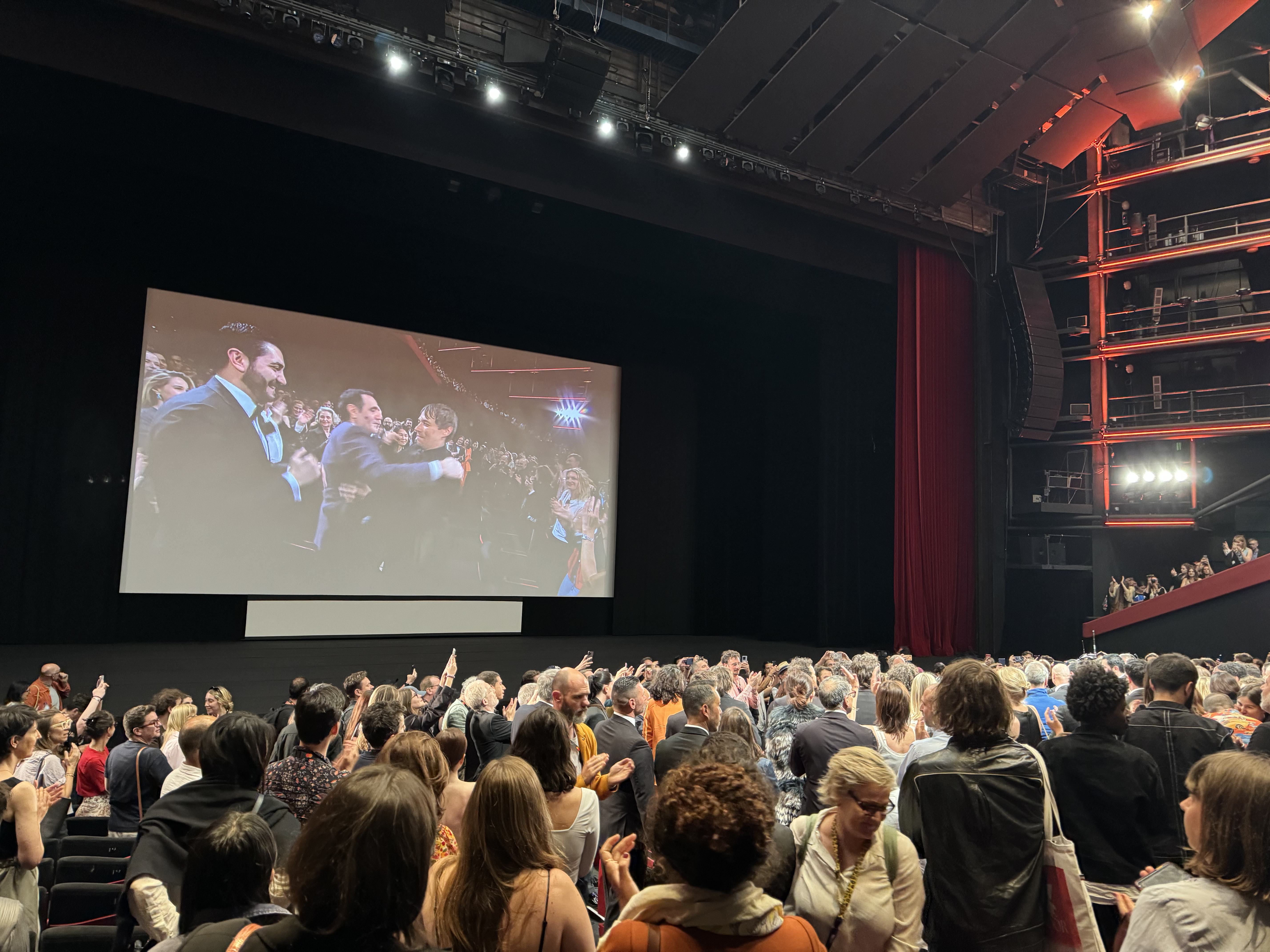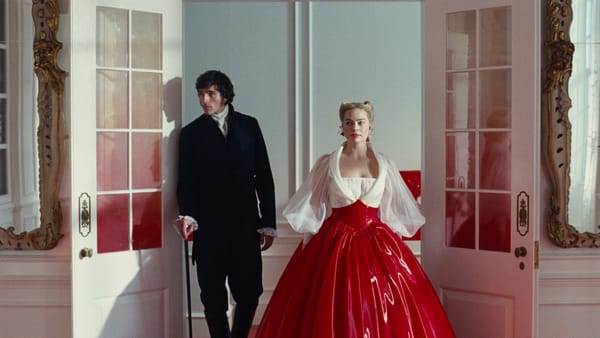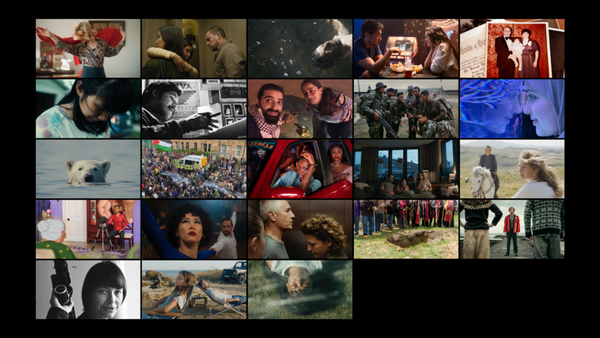Cannes 2024: Sean Baker’s ‘Anora’ Is One of the Best Films of the Year
Stephen David Miller shares his review of Anora, as well as mini-reviews of other major Cannes titles.


This is the fourth post from Stephen David Miller covering the Cannes Film Festival. Stephen will be back with one final wrap-up post next week. He is the co-host of The Spoiler Warning podcast. -David Chen
Hello again, Decoding Everything readers! I’m back for another installment of my 2024 Cannes Film Festival coverage. In each entry, I review a world premiere I caught here at Cannes, and try to sprinkle in some details about the broader festival along the way. My last three posts all focused on movies which were massively hyped since long before I showed up in France: Furiosa, Megalopolis, and Horizon. Each of these was a major production, and a giant swing for their respective directors. In this post, I’m going to switch gears and tell you about a significantly smaller film that’s also coming to a theater near you at some point in the future: Sean Baker’s Anora. Although it hasn’t received anywhere near the hype of my last three entries, it deserves to have its praises shouted from the rooftops.
And at this point in the festival, it’s a gift to want to shout anything at all. As I write this, it has now been over a full week since the Official Competition began in earnest. That special adrenaline which first propelled us all to wait in multi-hour lines for films we didn’t know the name of, has now been reduced to a trickle with the intensity and duration of Kevin Costner’s tears: We might conjure it for 7, maybe 10 minutes max, but ultimately we’re running on fumes.
Speaking of Kevin Costner, let’s talk about hype.
Festival Snapshot: Hyped Premieres

In my intro, I referenced a widely circulated image of Kevin Costner crying at the Horizon premiere. Breathless news was shared about the lengthy standing ovation, with the implication that the world had just witnessed a once-in-a-lifetime event. But the dirty little secret about Cannes is that this is largely PR gibberish: In my four years of attending the festival, I’ve only seen a single film fail to get a standing ovation, and that’s because 80% of the audience had left before it finished. To an outsider, it’s difficult to separate manufactured hype from genuine excitement.
Up until now, I’ve made it a point to highlight underseen gems—stuff which likely won’t be hyped in U.S. publications, but is well worth your attention. But today, I’m going to flip that and talk about a handful of films you’re very likely to hear about in the coming months, anchored by a beloved filmmaker or actor or both. All of these will almost certainly come to a theater near you at some point before next year’s Oscars. What should you prioritize, and why?
- Yorgos Lanthimos’s Kinds of Kindness might be the single biggest film of the festival I haven’t reviewed. For this latest film, he’s brought back previous Poor Things collaborators Emma Stone and Willem Dafoe, as well as newcomers Hong Chau, Mamoudou Athie, and Jesse Plemons. Rather than tell a single story, Lanthimos presents us with an anthology of three roughly hour-long shorts, all of which orbit the blurry line between love and violence or obsession. I didn’t fawn over this quite as much as the critical consensus appears to have. Personally, I felt that each short overstayed its welcome. But it’s hard to deny the brilliance of the ideas that underpin these stories, or the uncompromising vision they represent. You’d have to go back to Killing of a Sacred Deer or Dogtooth to find him in such delightfully queasy form. Stone is brilliant as always, but for my money Jesse Plemons is the greatest new addition. He fits so perfectly in Yorgos’ off-kilter universe, it makes you wonder how it’s taken this long for them to find each other.
- Oh, Canada is the latest outing by legendary writer-director Paul Schrader, and it sees him teaming up with Richard Gere for the first time since 1980’s American Gigolo. Despite being based on a novel, the story feels extremely personal to Schrader. Gere stars as Leonard Fife, a beloved documentary filmmaker who came to prominence in the 70’s after fleeing to Canada to dodge the draft. Once a hot-shot idealist (as played by Jacob Elordi), he is now a bitter man filled with rage and regret. The plot is framed around a single interview, likely to be his last, in which Leonard tries to set the record straight about his history in the presence of his longsuffering wife (Uma Thurman). Like so many of Schrader’s characters, Leonard has myriad sins he’s hoping to confess to, but here, he can’t seem to keep track of them. What seemed poised to be a real tearjerker wound up being something considerably more difficult, and unfortunately, I don’t think it succeeded. Like its protagonist’s memories, the film follows a hazy, confusing logic, jumping back and forth through chronologies with contradictory timelines and little resolution. Rather than tell a story, this is a meditation on the impossibility of atonement, and the relief one would feel at no longer needing it at all—to declare bankruptcy on your sins, like dodging a draft. While I admired what Schrader was going for, and found it occasionally moving, I think he stripped away too much to make this work. An interesting entry in his canon for fans, but nowhere near the gut-punch I was hoping for.
- Sometimes, a movie comes around whose very existence seems like a miracle. Jacques Audiard’s Emilia Perez is one such example. Consider the factors at play here. It’s a Spanish-language crime story, featuring major supporting roles by Zoe Saldaña and Selena Gomez, centered around a powerful cartel boss who decides to transition into living as a woman. Did I mention it’s a musical? The film stars Karla Sofía Gascón as the druglord who becomes the titular Emilia, and it’s really something special to behold: spectacular, emotional, and irresistibly weird. While I don’t think it’s a perfect film—some of its treatment of the subject matter felt a little too simplistic for 2024, and the first half is far stronger than the second—I couldn’t help but fall for it just the same. In terms of sheer audacity and heart, there’s really nothing like it.
- Speaking of big swings that seem like they couldn’t possibly exist, let’s talk about Coralie Fargeat’s The Substance. Demi Moore stars as Elisabeth Sparkle, a once-beloved actress turned celebrity fitness instructor who learns that her contract isn’t being renewed: The big network honcho (Dennis Quaid) has spoken, and he demands someone younger and more titillating. This is when Sparkle stumbles upon a product called The Substance, which promises to let her live as a younger, more perfect version of herself (played by Margaret Qualley). What begins as merely a biting satire of the superficial beauty standards our culture forces upon women, eventually devolves into a full on Cronenbergian nightmare a la The Fly which will leave audiences positively squirming. Quaid is in hilarious, gonzo form here, and between this and Kinds of Kindness Qualley is having one hell of a year. But none of them can hold a candle to Moore, who gives an utterly fearless performance. If there’s any justice in this world, this will be recognized as the major comeback that it is. Despite my typical aversion to the body horror genre, this might just be my single favorite film here at Cannes.
- The same unfortunately cannot be said for the actual Cronenberg film that premiered here at Cannes. Cronenberg’s The Shrouds, is arguably the worst thing I’ve caught at the festival this year. Starring Vincent Cassel and Diane Kruger, it starts promisingly enough. A businessman (Cassel) invents a new piece of technology to deal with the loss of his wife (Kruger). The result is a controversial product called GraveTech, which gives survivors access to a real-time video feed of their loved ones’ bodies underground. We’re shown decaying corpses in voyeuristic focus, sinews and muscles and still-preserved teeth—in other words, very much this particular director’s jam. And I was here for it! But rather than build upon that mood, Cronenberg opts to tell a hackneyed conspiracy story about surveillance and sabotage, to laughably disastrous results. There are scenes of exposition delivered by Guy Pearce which are so bad, one has to assume they’re meant to be comedic. But if this is a comedy, no one else seems in on the joke. Far from eliciting dread, The Shrouds is as lifeless as one of GraveTech’s subjects.
- By contrast, I was filled with dread the moment I first read the synopsis of Ali Abbasi’s The Apprentice. After all, there are a million ways a period piece about the rise of Donald Trump (Sebastian Stan) under the tutelage of Roy Cohn (Jeremy Strong) could go off the rails—especially during an election year. It could shoot for something “cool” and turn into an inadvertent hagiography. Or more likely (and arguably more painfully) it could make an attempt at broad satire and wind up toothless and self-defeating, like an Alec Baldwin sketch on SNL. Shockingly, this one manages to avoid both pitfalls; this is a totally serviceable, middle-of-the-road biopic. Stan wisely underplays Trump for much of the film, sprinkling in vocal tics and delusions slowly as the story unfolds. Meanwhile, Strong is typically solid as the vulturous lawyer who took Donald under his wing, the spray-tanned Doctor Frankenstein to Trump’s bloviating monster. Strong’s character is just a few notches away from Kendall Roy, and the whole film plays like it could’ve been an episode of Succession. It isn’t a great movie, or even a particularly good one, but it also is nowhere near the disaster it had every right to be. And that alone is reason for us to celebrate.
And now, on to a film I can only hope will receive the hype it deserves:
The Movie: Sean Baker’s Anora
Sean Baker is one of my favorite contemporary American filmmakers. If you aren’t already familiar with his work, I highly recommend you take the plunge. He’s the poet laureate of the hustler class, the champion of people abandoned by society who are doing their damndest to survive. With each of his films, he holds a magnifying glass to the sort of character rarely given the big-screen treatment, finding beauty in both their perseverance and their (often sizable) flaws. Frequently working with first-time actors, Baker puts a premium on authenticity, and it shows. His breakout, Tangerine, was a holiday buddy comedy about two trans sex workers, shot exclusively on iPhones in the streets of LA. With The Florida Project, he shined a light on the precariously-housed of America. The slice-of-life drama centered around a single mother and her six-year-old daughter living in a budget motel somewhere in the shadow of Disney World. Red Rocket saw Baker deviating from his naturalistic approach, blowing up his narrative to match the heightened reality of his protagonist: a washed-up porn star (Simon Rex) with a delusion of grandeur so potent it distorts everything he touches.
Anora continues Baker’s trend of scaling things up, and I loved every minute of it. This is a propulsive, crowd-pleasing rollercoaster of an experience. It’s one of my favorite films to premiere at Cannes this year.
The titular Anora (Mikey Madison) is an exotic dancer and part-time escort working at a strip club in New York—and please, she insists you call her “Ani.” Ani has a job to do, and she’s very, very good at it: sparkling, self-possessed, and quick on her feet, she susses out her clients the instant she meets them and knows precisely how to make them feel at home. She also happens to be fluent in Russian, making her the perfect choice to entertain a new VIP named Ivan (Mark Eidelstein). Ivan, or “Vanya” as he’s colloquially known, is a high-roller. The 21-year-old son of a powerful Russian oligarch, he idles away the day in his Brighton Beach mansion like a horny, college-aged Richie Rich: throwing booze-heavy parties, playing first-person shooters on the couch, and having copious sex at jackrabbit speeds which he’s happy to pay for in cash. He’s enchanted by Ani from the very first dance, and responds to her friendly working demeanor like a kid in a Nickelodeon Super Toy Run. He’s giddy; he wants it all. It doesn’t take long for their arrangement to balloon from a private room at the club, to a night together at his house, to a weeklong, all-inclusive girlfriend experience culminating in an impromptu trip to Vegas. When they return to New York a day or two later, it is no longer as a client and an escort, but as husband and wife—much to the chagrin of Vanya’s parents.
In many ways this is familiar territory for Sean Baker, chronicling a few days in the life of a protagonist who would hardly be a side character in mainstream cinema. But typically there’s been some level of abrasiveness to his characters; in the case of Red Rocket, he is arguably a monster. Whereas Ani is a total joy to root for from beginning to end. Even when she’s wrong, she wins us over. Despite every rational instinct in me screaming that her whirlwind romance was doomed, I was as charmed by it as I would be any wholesome romcom classic. And when outside forces threaten her fairytale love story, I perceived it the same way Ani would. A crisis manufactured by joyless parents who don’t understand matters of the heart, like a threat to something beautiful that needs to be extinguished. I felt optimistic because she was optimistic.
That infectious optimism makes this Baker’s most accessible film by miles. I realize that “accessible” probably sounds like a surprising descriptor for an intensely R-rated story about a sex worker who wants to stay married to a frivolous playboy, but it’s true: The energy in my screening was electric. I haven’t heard an audience react so enthusiastically to anything else in competition this year. There were howls of laughter, impromptu rounds of applause, and moments of stunned silence precisely when the film demanded it. Like Ani to her clients, Baker had us eating out of the palm of his hand.
Much of this is due to the wonderful cast. Eidelstein is delightfully awkward in his portrayal of Vanya, a selfish-but-mostly-harmless party animal who has never seen anything he couldn’t own. He captures a very specific brand of stunted adolescence, which can either make him cute as a puppy or profoundly infuriating depending on our (which is to say, Ani’s) mood. We’re also introduced to a motley crew of Ivan’s babysitters/handlers, who grow increasingly desperate as his parents tighten their grip: Karren Karagulian as the family friend entrusted with their sweet little man-child, Yuriy Borisov and Vache Tovmasyan as his ill-equipped henchmen. They bring a perfect combination of intensity and lightness to the proceedings, sending the narrative into crime comedy-drama territory which feels equal parts the Coens and the Safdies.
Ultimately, though, the film belongs to Madison. She so effortlessly inhabits the character of Anora you’d think Sean Baker had met her at the altar of a Vegas chapel, bribed her client to hold off on the engagement, and convinced her to star in his next movie. She’s phenomenal, capable of carrying virtually every frame of Anora with aplomb, or selling even the most problematic dialogue like it were Shakespeare. It’s a dazzling performance, and it’s vital for the tightrope Baker’s script is walking.
Earlier, I mentioned that one of the audience responses was “stunned silence.” While this is primarily a comedy, it also functions as an intensely moving drama. Far from being at odds with its lighthearted tone, the drama is actually deepened by it. See, there’s a recurring theme I’ve noticed at the festival this year. It has to do with the dream of a reset button: the hope that some life raft is floating out there somewhere, and if you could only just find it and grab on tight you’d find yourself changed for the better. Freed from the burdens of day-to-day life. Wild Diamond’s Liane finds hope in a Love Island-style reality show. Bird’s Bailey seeks it in a free-spirited stranger. Oh Canada’s Leonard imagines it as a literal border, a line past which shame is unable to follow. Emilia Perez’s titular protagonist seeks it through a change of core identity. The Substance’s Elisabeth seeks it through a superficial rebirth.
What Vanya is offering to Ani is the hope of a better life. A life where she no longer needs to tailor her behavior to accommodate the whims of high-rolling assholes, but rather to live in their social strata, to be respected on her terms. This dream is so palpable, I frequently found myself on the verge of tears when nothing much was happening on screen: a silly party montage, say, or a trip on a private jet. It felt emotional, because it meant something to her. When the cracks in her dream start to reveal themselves, Ani fights with an intensity that has less to do with love than it does with self-preservation—and I wound up fighting alongside her. On one occasion, Baker pulls back the curtain and lets all this subtext become text. It’s a grace note that I’m still reeling from, a full day later.
Anora is the whole package. It’s wildly entertaining, laugh-out-loud funny, thought-provoking, challenging, and emotionally astute. I adored it. It already has a U.S. distributor in Neon, which means it should be headed to a theater near you well before awards season. I do hope you make a point of seeking it out, and that you fall in love as much as I have.

Or if you need more convincing, take a look at the photo of this film’s standing ovation. I know I told you that that’s a meaningless metric, but sometimes we just have to take a cue from Anora and suspend our disbelief. The clapping meant something this time; it had to!



